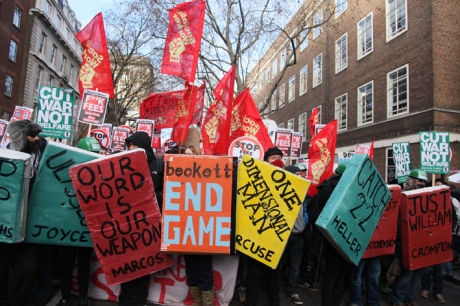Image from the artsagainstcuts blog
“We live within networks of messages, signs, information, and knowledge which produce our experience of ourselves, society, and all that we consider real. And, as power produces its subjects, so it gives birth to antagonists and the forms of resistance with which it is irreducibly implicated.” p.119 Sadie Plant The Most Radical Gesture
I haven’t spoken much about the protests against the cuts on here, I have been at a few, which you will have seen if you follow me on Twitter or Audioboo. But I haven’t felt like I’ve quite been able to marshall my thoughts to communicate them to you. But I have been there; I have seen people beaten to the ground, I have see the police charge on me, I have thankfully thus far avoided being kettled due to a combination of being dressed smart, luck, and sense of when people are suddenly pelting in the opposite direction. I have walked dazed bleeding people to taxis with directions and a tenner to the nearest hospital because (apparently) Police medics are only technically there to look after police. I have seen cold, frightened young people, stand together with parents, with older people, with disabled people, and be driven back like animals, penned, and deprived of food, toilets, water, liberty. And I have seen those people burn things to keep warm, seen hands raised and voices cry ‘don’t push us back, we’ve nowhere else to go’. I have seen angry angry people, some of whom aren’t even old enough to vote, raise the only voice they know will be heard; in violent action. And then I see what the media sees, because kettling is such a brilliant way to make sure all the photographers and the protesters are in the same place. So they smash a window, poke a princess. Violence is decried, the protesters dismissed. Despite the fact that that violence was not against humans, but symbols of the blind privilege of the ruling elite.
And I believe in parliament, I do believe that the majority of people there are there because they want to fight for the world which they think is best, and that the best way they can do so in small, measured wades through sticky, muggy, heavy beaurocracy. But I also believe that the mainstream media has hamstrung our politicians and society to the point that only the thickest skins make it. And thick skins get used to not hearing things in order to exist. So they don’t hear the cries of the people trapped just metres from their workplace.
“[the kettle] is also a media strategy which seeks to concentrate the spectacle of violent protest into a defined space precisely for the media. Thus the physical terrain of the kettled site is marshalled to produce violent spectacle for media consumption. It is a type of siege that lets the police appear under attack. The kettle thus needs to be understood as a form of media strategy deployed by the police to delegitimize protests and re-symbolize legitimate protest as unlawful ‘riot’. The kettle attempts to cast opposition protests as such as radical, violent and in need of police repression, whose brutality is legitimated by this same spectacle of student violence that the kettle aims to facilitate.” Rory Rowan on the brilliant Critical Legal Thinking
And I also believe that the mainstream media has made us believe that politicians are not people, and politics is complicated; and made politicians believe that people don’t understand politics, and just aren’t interested.
 Image from the
Image from the 